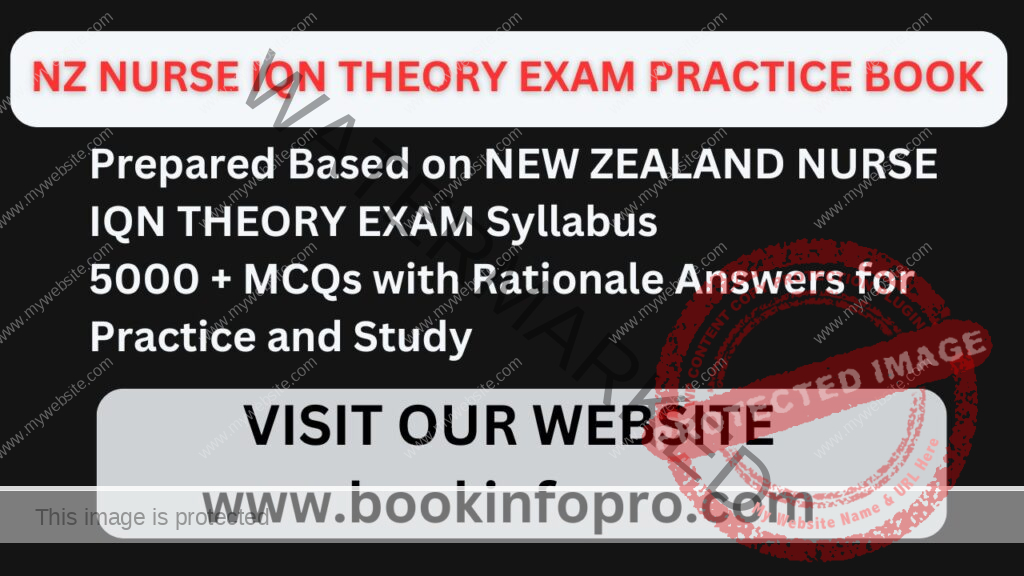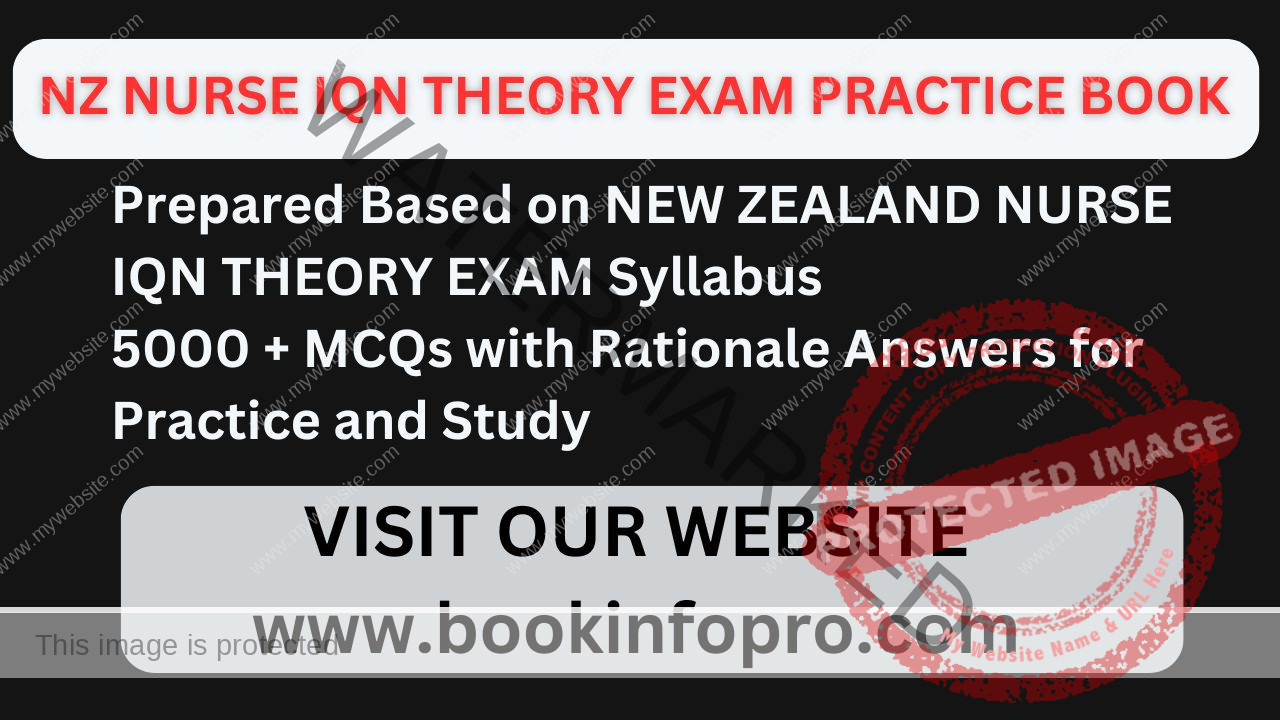New Zealand Nurse IQN Theoretical Exam Practice Questions with Answer
we have given previous year New Zealand Nurse IQN Theoretical exam questions with answer to prepare for international qualify nurses.
The IQN NZ (Internationally Qualified Nurses New Zealand) theoretical exam is part assessment, designed for nurses who are internationally qualified and wish to practice nursing in New Zealand.
visit website for www.bookinfopro.com
Nursing Care MCQs
Question 1: A nurse is assessing a patient’s level of consciousness. The patient opens their eyes to verbal stimuli, but does not follow commands. How would this level of consciousness be classified?
a) Alert
b) Lethargic
c) Stuporous
d) Comatose
Answer: c) Stuporous
Explanation: Stuporous patients respond to stimuli but do not follow commands.
Question 2: A patient reports an allergy to penicillin. Which of the following is the most appropriate action for the nurse to take?
a) Document the allergy in the medical record and notify the healthcare team
b) Administer penicillin and observe for adverse reactions
c) Give a different antibiotic without notifying the healthcare provider
d) Ask the patient to undergo an allergy test
Answer: a) Document the allergy in the medical record and notify the healthcare team
Explanation: Allergies should be documented and the healthcare team notified to prevent potential reactions.
Question 3: A nurse is administering a medication that requires a “peak and trough” blood test. What does this test measure?
a) The highest and lowest concentrations of the medication in the blood
b) The patient’s blood pressure before and after medication administration
c) The therapeutic range of the medication
d) The effectiveness of the medication
Answer: a) The highest and lowest concentrations of the medication in the blood
Explanation: “Peak and trough” tests determine the highest and lowest medication concentrations to ensure safe and effective dosing.
Question 4: A patient with a history of heart disease is experiencing chest pain. What is the first action a nurse should take?
a) Administer oxygen
b) Call for emergency assistance
c) Assess the patient’s vital signs
d) Administer prescribed nitroglycerin
Answer: c) Assess the patient’s vital signs
Explanation: Assessing vital signs helps determine the severity of the chest pain and the appropriate next steps.
Question 5: A nurse is providing post-operative care to a patient who underwent abdominal surgery. Which of the following signs indicates a potential complication?
a) Persistent abdominal pain and rigidity
b) Slight swelling around the incision site
c) Mild fever for the first 24 hours
d) Increased bowel sounds
Answer: a) Persistent abdominal pain and rigidity
Explanation: Persistent pain and rigidity can indicate internal bleeding or infection, requiring immediate attention.
Question 6: What is the purpose of a “Time Out” procedure in the operating room?
a) To verify the correct patient, procedure, and site before surgery
b) To allow the surgical team to take a break
c) To ensure the surgical instruments are counted
d) To document the start time of the surgery
Answer: a) To verify the correct patient, procedure, and site before surgery
Explanation: A “Time Out” is a safety procedure to prevent surgical errors by confirming the correct patient, procedure, and site.
Question 7: A patient receiving a blood transfusion develops hives and itching. What should the nurse do first?
a) Stop the transfusion
b) Administer an antihistamine
c) Slow the rate of transfusion
d) Notify the healthcare provider
Answer: a) Stop the transfusion
Explanation: The first action is to stop the transfusion to prevent further allergic reactions or complications.
Question 8: A nurse is assessing a patient’s neurological status and finds that the patient has unequal pupils. What should the nurse do next?
a) Report the finding to the healthcare provider
b) Continue with the assessment and recheck the pupils later
c) Document the finding and monitor for changes
d) Ask the patient if they have had recent eye surgery
Answer: a) Report the finding to the healthcare provider
Explanation: Unequal pupils can indicate neurological issues that require immediate evaluation by a healthcare provider.
Question 9: A nurse is administering a new medication to a patient. What is the most important action to take before administration?
a) Check the medication order for accuracy
b) Explain the medication’s purpose to the patient
c) Ask the patient about allergies
d) All of the above
Answer: d) All of the above
Explanation: Ensuring accuracy, informing the patient, and checking for allergies are all critical steps before administering a new medication.
Question 10: A patient with diabetes is experiencing hypoglycemia. What are the typical signs and symptoms of this condition?
a) Confusion, sweating, and tremors
b) Excessive thirst and frequent urination
c) Rapid weight loss and fatigue
d) Flushed skin and high blood pressure
Answer: a) Confusion, sweating, and tremors
Explanation: Hypoglycemia can cause confusion, sweating, tremors, and other symptoms due to low blood sugar levels.
visit website for www.bookinfopro.com


